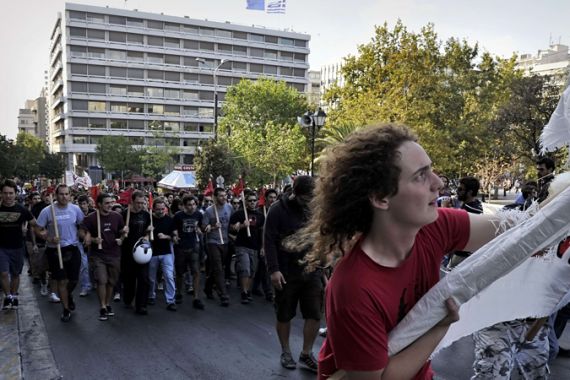Greek cabinet okays retrenchment plan
About 30,000 state workers to lose jobs after being put on reserve as indebted country battles to stave off bankruptcy.

| Prime Minister George Papandreou’s government has yet to announce how the redundancy plan will work |
The Greek cabinet has approved a measure to begin reducing the number of state workers, a contentious part of an austerity plan aimed at freeing up EU and IMF loans.
The plan, endorsed on Sunday, creates a “labour reserve” allowing state workers to be placed on partial pay and be dismissed a year after.
Keep reading
list of 4 itemsBoeing hit with 32 whistleblower claims, as dead worker’s case reviewed
US imposes new sanctions on Iran after attack on Israel
A flash flood and a quiet sale highlight India’s Sikkim’s hydro problems
The government has said it will put 30,000 workers in the reserve by the end of this year.
The finance ministry said in a statement after Sunday’s cabinet meeting that the 2012 draft budget, under which redundancies will be catered for, had been approved.
“The budget draft will be submitted tomorrow to parliament,” the statement said.
The move is the most contentious part of a reform package demanded by the EU and the IMF.
Without the release of a $14bn tranche of an EU bailout, massively indebted Greece could run out of money to pay state wage bills within weeks.
There are fears another debt default could wreck the balance sheets of European banks, damage the prospects of the euro single currency and possibly plunge the world into a new global financial crisis.
European officials are scrambling to avert the crisis amid calls for Greece to abandon the euro.
A senior member of the ruling coalition in Germany, Europe’s paymaster, said it may be necessary for Greece to get out of the eurozone, a prospect European governments officially reject as beyond consideration.
Unpopular
The latest round of austerity measures are deeply unpopular in Greece, and public sector unions hope that strikes and demonstrations can wreck the Socialist government’s resolve to enact them.
Workers to be laid off make up a fifth of the Greek workforce and are guaranteed jobs for life under a constitution that bans firing government employees in virtually all circumstances, making the move deeply unpopular.
Under the plan, 30,000 workers would be put in the reserve by the end of this year and paid 60 per cent of their salaries for a year, after which they would be dismissed.
The government has yet to announce how the programme would work, including details such as whether it would be used to push out younger workers, or only to accelerate the retirement of workers already reaching pension age.
Spending irregularities
Negotiators from the IMF, EU and the European Central Bank (ECB), known as the troika, have returned to Athens, the Greek capital, after walking out of talks a month ago, and have met Greek officials for the past four days.
|
Al Jazeera speaks to Vanessa Rossi, economic adviser to Oxford Analytica |
To persuade the troika to release the loans, the government has promised to introduce new taxes, cut state wages by an average of 20 per cent and reduce the number of public sector workers by a fifth by 2015.
The officials spent the weekend trying to obtain the most accurate, up-to-date picture of Greece’s finances and forecasts, after protests, including staff occupations of ministries, meant a slow resumption of negotiations last week.
Olli Rehn, the EU economic and monetary affairs commissioner, will brief ministers in Luxembourg on Monday on what the Washington-based IMF wants to do, as looming recession risks turning Greece’s crisis into global catastrophe.
There remains the spectre of imminent default, as anticipated by markets treating Greek sovereign bonds as monopoly bets.
Their expectation is that the ECB, soon under new Italian management, will step back in.